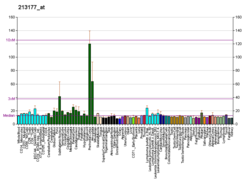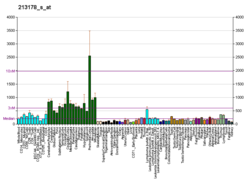From Wikipedia, the free encyclopedia
Protein-coding gene in the species Homo sapiens
C-jun-amino-terminal kinase-interacting protein 3 is an enzyme that in humans is encoded by the MAPK8IP3 gene .[ 5] [ 6] [ 7]
The protein encoded by this gene shares similarity with the product of Drosophila syd gene, required for the functional interaction of kinesin I with axonal cargo. Studies of the similar gene in mouse suggested that this protein may interact with and regulate the activity of numerous protein kinases of the JNK signaling pathway, and thus function as a scaffold protein in neuronal cells. The C. elegans counterpart of this gene is found to regulate synaptic vesicle transport, possibly by integrating JNK signaling and kinesin-1 transport. Several alternatively spliced transcript variants of this gene have been described, but the full-length nature of some of these variants has not been determined.[ 7]
MAPK8IP3 has been shown to interact with ASK1 ,[ 8] C-Raf ,[ 5] [ 9] PTK2 ,[ 10] MAPK10 ,[ 5] [ 6] [ 8] Mitogen-activated protein kinase 9 ,[ 5] [ 6] MAPK8 ,[ 5] [ 6] MAP2K1 ,[ 5] [ 9] KLC2 ,[ 11] MAP2K7 ,[ 6] [ 8] KLC1 ,[ 11] MAPK8IP2 [ 6] MAP2K4 .[ 5] [ 8]
^ a b c GRCh38: Ensembl release 89: ENSG00000138834 – Ensembl , May 2017^ a b c GRCm38: Ensembl release 89: ENSMUSG00000024163 – Ensembl , May 2017^ "Human PubMed Reference:" . National Center for Biotechnology Information, U.S. National Library of Medicine .^ "Mouse PubMed Reference:" . National Center for Biotechnology Information, U.S. National Library of Medicine .^ a b c d e f g Ito M, Yoshioka K, Akechi M, Yamashita S, Takamatsu N, Sugiyama K, Hibi M, Nakabeppu Y, Shiba T, Yamamoto KI (November 1999). "JSAP1, a novel jun N-terminal protein kinase (JNK)-binding protein that functions as a Scaffold factor in the JNK signaling pathway" . Mol Cell Biol . 19 (11): 7539–48. doi :10.1128/mcb.19.11.7539 . PMC 84763 PMID 10523642 . ^ a b c d e f Kelkar N, Gupta S, Dickens M, Davis RJ (February 2000). "Interaction of a mitogen-activated protein kinase signaling module with the neuronal protein JIP3" . Mol Cell Biol . 20 (3): 1030–43. doi :10.1128/MCB.20.3.1030-1043.2000 . PMC 85220 PMID 10629060 . ^ a b "Entrez Gene: MAPK8IP3 mitogen-activated protein kinase 8 interacting protein 3" .^ a b c d Matsuura, Hiroshi; Nishitoh Hideki; Takeda Kohsuke; Matsuzawa Atsushi; Amagasa Teruo; Ito Michihiko; Yoshioka Katsuji; Ichijo Hidenori (October 2002). "Phosphorylation-dependent scaffolding role of JSAP1/JIP3 in the ASK1-JNK signaling pathway. A new mode of regulation of the MAP kinase cascade" . J. Biol. Chem . 277 (43). United States: 40703–9. doi :10.1074/jbc.M202004200 hdl :2297/2692 ISSN 0021-9258 . PMID 12189133 . ^ a b Kuboki, Y; Ito M; Takamatsu N; Yamamoto K I; Shiba T; Yoshioka K (December 2000). "A scaffold protein in the c-Jun NH2-terminal kinase signaling pathways suppresses the extracellular signal-regulated kinase signaling pathways" . J. Biol. Chem . 275 (51). UNITED STATES: 39815–8. doi :10.1074/jbc.C000403200 ISSN 0021-9258 . PMID 11044439 . ^ Takino, Takahisa; Yoshioka Katsuji; Miyamori Hisashi; Yamada Kenneth M; Sato Hiroshi (September 2002). "A scaffold protein in the c-Jun N-terminal kinase signaling pathway is associated with focal adhesion kinase and tyrosine-phosphorylated" . Oncogene . 21 (42). England: 6488–97. doi :10.1038/sj.onc.1205840 ISSN 0950-9232 . PMID 12226752 . ^ a b Bowman, A B; Kamal A; Ritchings B W; Philp A V; McGrail M; Gindhart J G; Goldstein L S (November 2000). "Kinesin-dependent axonal transport is mediated by the sunday driver (SYD) protein" . Cell . 103 (4). UNITED STATES: 583–94. doi :10.1016/S0092-8674(00)00162-8 ISSN 0092-8674 . PMID 11106729 . S2CID 247102 .
Kikuno R, Nagase T, Ishikawa K, et al. (1999). "Prediction of the coding sequences of unidentified human genes. XIV. The complete sequences of 100 new cDNA clones from brain which code for large proteins in vitro" . DNA Res . 6 (3): 197–205. doi :10.1093/dnares/6.3.197 PMID 10470851 . Kuboki Y, Ito M, Takamatsu N, et al. (2001). "A scaffold protein in the c-Jun NH2-terminal kinase signaling pathways suppresses the extracellular signal-regulated kinase signaling pathways" . J. Biol. Chem . 275 (51): 39815–8. doi :10.1074/jbc.C000403200 PMID 11044439 . Bowman AB, Kamal A, Ritchings BW, et al. (2001). "Kinesin-dependent axonal transport is mediated by the sunday driver (SYD) protein" . Cell . 103 (4): 583–94. doi :10.1016/S0092-8674(00)00162-8 PMID 11106729 . S2CID 247102 . Daniels RJ, Peden JF, Lloyd C, et al. (2001). "Sequence, structure and pathology of the fully annotated terminal 2 Mb of the short arm of human chromosome 16" . Hum. Mol. Genet . 10 (4): 339–52. doi :10.1093/hmg/10.4.339 PMID 11157797 . Hattori A, Okumura K, Nagase T, et al. (2001). "Characterization of long cDNA clones from human adult spleen" . DNA Res . 7 (6): 357–66. doi :10.1093/dnares/7.6.357 PMID 11214971 . Akechi M, Ito M, Uemura K, et al. (2001). "Expression of JNK cascade scaffold protein JSAP1 in the mouse nervous system". Neurosci. Res . 39 (4): 391–400. doi :10.1016/S0168-0102(01)00194-8 . PMID 11274738 . S2CID 37577286 . Byrd DT, Kawasaki M, Walcoff M, et al. (2002). "UNC-16, a JNK-signaling scaffold protein, regulates vesicle transport in C. elegans" . Neuron . 32 (5): 787–800. doi :10.1016/S0896-6273(01)00532-3 PMID 11738026 . S2CID 16942260 . Matsuura H, Nishitoh H, Takeda K, et al. (2002). "Phosphorylation-dependent scaffolding role of JSAP1/JIP3 in the ASK1-JNK signaling pathway. A new mode of regulation of the MAP kinase cascade" . J. Biol. Chem . 277 (43): 40703–9. doi :10.1074/jbc.M202004200 hdl :2297/2692 PMID 12189133 . Takino T, Yoshioka K, Miyamori H, et al. (2002). "A scaffold protein in the c-Jun N-terminal kinase signaling pathway is associated with focal adhesion kinase and tyrosine-phosphorylated" . Oncogene . 21 (42): 6488–97. doi :10.1038/sj.onc.1205840 PMID 12226752 . Strausberg RL, Feingold EA, Grouse LH, et al. (2003). "Generation and initial analysis of more than 15,000 full-length human and mouse cDNA sequences" . Proc. Natl. Acad. Sci. U.S.A . 99 (26): 16899–903. Bibcode :2002PNAS...9916899M . doi :10.1073/pnas.242603899 PMC 139241 PMID 12477932 . Ota T, Suzuki Y, Nishikawa T, et al. (2004). "Complete sequencing and characterization of 21,243 full-length human cDNAs" . Nat. Genet . 36 (1): 40–5. doi :10.1038/ng1285 PMID 14702039 . Brandenberger R, Wei H, Zhang S, et al. (2005). "Transcriptome characterization elucidates signaling networks that control human ES cell growth and differentiation". Nat. Biotechnol . 22 (6): 707–16. doi :10.1038/nbt971 . PMID 15146197 . S2CID 27764390 . Beausoleil SA, Jedrychowski M, Schwartz D, et al. (2004). "Large-scale characterization of HeLa cell nuclear phosphoproteins" . Proc. Natl. Acad. Sci. U.S.A . 101 (33): 12130–5. Bibcode :2004PNAS..10112130B . doi :10.1073/pnas.0404720101 PMC 514446 PMID 15302935 . Morita N, Iizuka K, Murakami T, Kawaguchi H (2005). "N-terminal kinase, and c-Src are activated in human aortic smooth muscle cells by pressure stress". Mol. Cell. Biochem . 262 (1–2): 71–8. doi :10.1023/B:MCBI.0000038218.09259.1c . PMID 15532711 . S2CID 23799480 . Martin J, Han C, Gordon LA, et al. (2005). "The sequence and analysis of duplication-rich human chromosome 16" . Nature . 432 (7020): 988–94. Bibcode :2004Natur.432..988M . doi :10.1038/nature03187 PMID 15616553 . Song JJ, Lee YJ (2005). "Cross-talk between JIP3 and JIP1 during glucose deprivation: SEK1-JNK2 and Akt1 act as mediators" . J. Biol. Chem . 280 (29): 26845–55. doi :10.1074/jbc.M502318200 PMID 15911620 . Takino T, Nakada M, Miyamori H, et al. (2006). "JSAP1/JIP3 cooperates with focal adhesion kinase to regulate c-Jun N-terminal kinase and cell migration" . J. Biol. Chem . 280 (45): 37772–81. doi :10.1074/jbc.M505241200 PMID 16141199 . Oh JH, Yang JO, Hahn Y, et al. (2006). "Transcriptome analysis of human gastric cancer". Mamm. Genome . 16 (12): 942–54. doi :10.1007/s00335-005-0075-2 . PMID 16341674 . S2CID 69278 .







